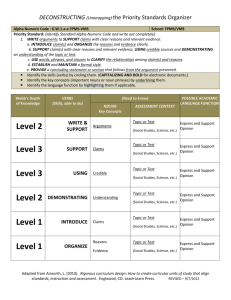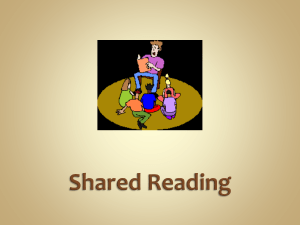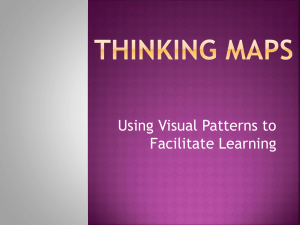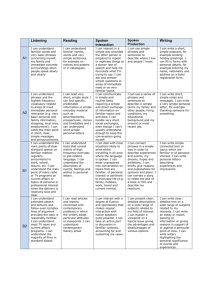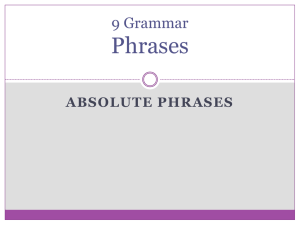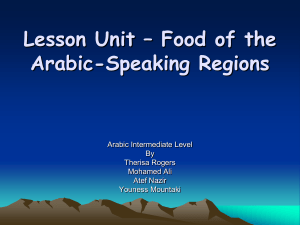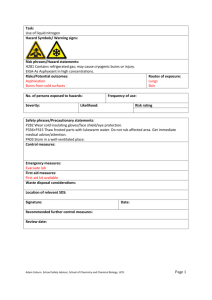Languages_Steps_KS2_making_and_reporting_progress
advertisement
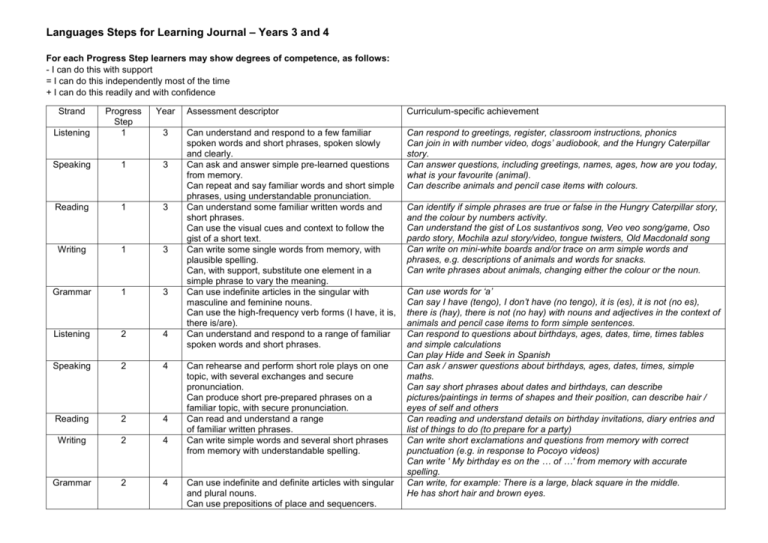
Languages Steps for Learning Journal – Years 3 and 4 For each Progress Step learners may show degrees of competence, as follows: - I can do this with support = I can do this independently most of the time + I can do this readily and with confidence Strand Year Listening Progress Step 1 Speaking 1 3 Reading 1 3 Writing 1 3 Grammar 1 3 Listening 2 4 Speaking 2 4 Reading 2 4 Writing 2 4 Grammar 2 4 3 Assessment descriptor Curriculum-specific achievement Can understand and respond to a few familiar spoken words and short phrases, spoken slowly and clearly. Can ask and answer simple pre-learned questions from memory. Can repeat and say familiar words and short simple phrases, using understandable pronunciation. Can understand some familiar written words and short phrases. Can use the visual cues and context to follow the gist of a short text. Can write some single words from memory, with plausible spelling. Can, with support, substitute one element in a simple phrase to vary the meaning. Can use indefinite articles in the singular with masculine and feminine nouns. Can use the high-frequency verb forms (I have, it is, there is/are). Can understand and respond to a range of familiar spoken words and short phrases. Can respond to greetings, register, classroom instructions, phonics Can join in with number video, dogs’ audiobook, and the Hungry Caterpillar story. Can answer questions, including greetings, names, ages, how are you today, what is your favourite (animal). Can describe animals and pencil case items with colours. Can rehearse and perform short role plays on one topic, with several exchanges and secure pronunciation. Can produce short pre-prepared phrases on a familiar topic, with secure pronunciation. Can read and understand a range of familiar written phrases. Can write simple words and several short phrases from memory with understandable spelling. Can use indefinite and definite articles with singular and plural nouns. Can use prepositions of place and sequencers. Can identify if simple phrases are true or false in the Hungry Caterpillar story, and the colour by numbers activity. Can understand the gist of Los sustantivos song, Veo veo song/game, Oso pardo story, Mochila azul story/video, tongue twisters, Old Macdonald song Can write on mini-white boards and/or trace on arm simple words and phrases, e.g. descriptions of animals and words for snacks. Can write phrases about animals, changing either the colour or the noun. Can use words for ‘a’ Can say I have (tengo), I don’t have (no tengo), it is (es), it is not (no es), there is (hay), there is not (no hay) with nouns and adjectives in the context of animals and pencil case items to form simple sentences. Can respond to questions about birthdays, ages, dates, time, times tables and simple calculations Can play Hide and Seek in Spanish Can ask / answer questions about birthdays, ages, dates, times, simple maths. Can say short phrases about dates and birthdays, can describe pictures/paintings in terms of shapes and their position, can describe hair / eyes of self and others Can reading and understand details on birthday invitations, diary entries and list of things to do (to prepare for a party) Can write short exclamations and questions from memory with correct punctuation (e.g. in response to Pocoyo videos) Can write ' My birthday es on the … of …' from memory with accurate spelling. Can write, for example: There is a large, black square in the middle. He has short hair and brown eyes. Languages Steps for Learning Journal – Years 5 and 6 For each Progress Step learners may show degrees of competence, as follows: - I can do this with support = I can do this independently most of the time + I can do this readily and with confidence Strand Year Listening Progress Step 3 Speaking 3 5 Reading 3 5 Writing 3 5 Grammar 3 5 Listening 4 6 Speaking 4 6 Reading 4 6 Writing 4 6 Grammar 4 6 5 Assessment descriptor Curriculum-specific achievement Can understand the main points of a short spoken passage made up of a few familiar words and phrases, delivered slowly and clearly. Can ask and answer simple questions on the current topic. Can produce some short phrases independently (without written support) within a familiar topic, with good pronunciation. Can understand familiar words and very simple sentences. Can use a dictionary and word list. Can understand essential likes / dislikes relating to food and sports. Can understand and respond to movement instructions. Can write words, phrases and short simple sentences from his/her repertoire from memory with understandable spelling. Can use all persons of several regular verbs in the present tense (with the support of a frame). Can understand a short passage made up of familiar words and basic phrases concerning self, people, places or simple actions when people speak slowly and clearly. Can ask and answer simple questions on a few very familiar topics, including expressing opinions and responding to those of others. Can use simple phrases and sentences independently to describe people, places, things and actions, with good pronunciation. Can understand a short text made up of short sentences with familiar language on a familiar topic. Can use a dictionary or word list. Can write a short, simple text from memory, using simple sentences from one familiar topic with reasonable spelling. Can use high-frequency verb forms, nouns, articles and adjectives to form simple sentences. Can ask/answer questions about times, meals, food likes and dislikes, sports you do, sports you like, instruments you play, why you like things. Can describe actions: eating / drinking at different times, playing sports and instruments, express opinions and give simple reasons. Can read short texts (e.g. about sports) and answer questions to show understanding. Can use alphabetical order, recognise and use the main dictionary codes for nouns, and find the meanings of new nouns. Can write sentences about what you eat when, and what sports you do when, and what instruments you can play. Can write sentences describing which sports or instruments people play. Can express likes and dislikes using the definite article with the verb GUSTAR. Can understand and respond to a range of spoken opinions heard in sentences and short text by ordering cards, identifying positive/negative opinions and by picking out details from short texts. Can ask / answer about likes and dislikes on a few topics, what the weather is like, why places/events are well-known, and main details about particular festivals. Can describe the key geographical features of Spain, where things are, and the key features of famous festivals. Can respond by completing gap-fill activities, cloze activities and identifying the odd one out. Can look up unknown nouns and adjectives, check the gender of nouns and the spelling of familiar words. Can express opinions, give reasons, describe places (from memory) e.g. in a holiday postcard Can describe actions: festivals at home and in FL country (with support) Can use adjectives in reasons with agreement. Can use the verbs to express ‘is / are’ and ‘there is/are’

